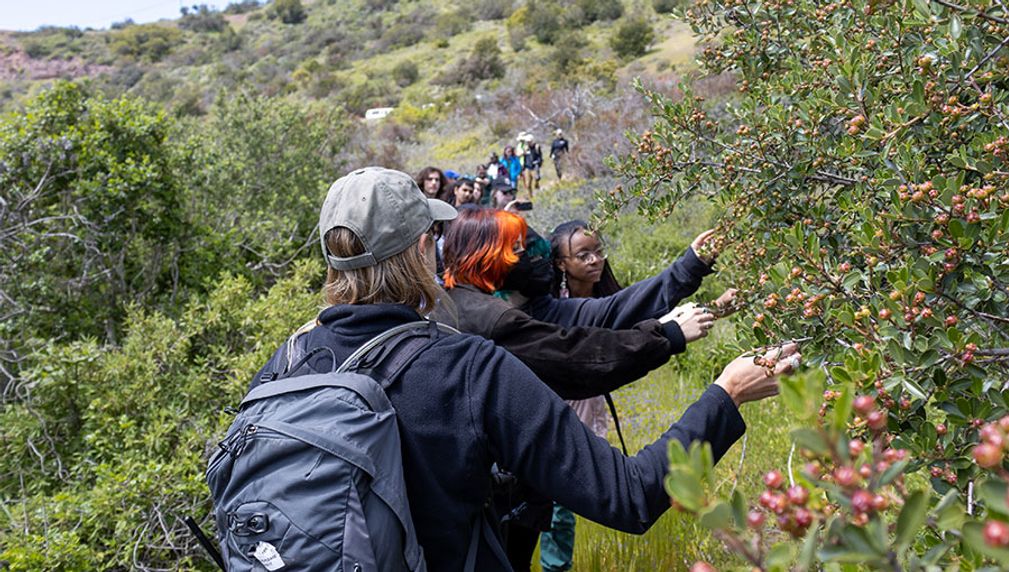Zoo Camp Scholarships and Teen Council for Conservation
This proposal is for two LA Zoo youth programs: Teen Council for Conservation, and Zoo Camp Scholarships. The Teen Council for Conservation brings 30 high-schoolers together to strengthen their leadership and community building skills, focusing on conservation and social and environmental justice. Zoo Camp Scholarships allow children with the greatest financial need to attend the Zoo’s summer camp program for fun experiences learning about wildlife and conservation through structured programs, talks, crafts, and animal encounters at the zoo.

What is the primary issue area that your application will impact?
K-12 STEAM education
In what stage of innovation is this project, program, or initiative?
Expand existing project, program, or initiative (expanding and continuing ongoing, successful work)
What is your understanding of the issue that you are seeking to address?
The 2022 California NextGen Climate Survey revealed that 80% of California youth aged 14-24 experienced climate-related distress. A study by the Environmental Diversity Working Group found that racial and ethnic minorities comprise only about 16% of employees in environmental organizations and agencies, despite representing about 39% of the U.S. population. Many Teen Councilmembers reported feeling unheard and powerless in pursuing impactful environmental solutions. As communities disproportionately impacted by climate change grow, centering efforts on justice becomes vital. The Teen Council for Conservation and Zoo Camp Scholarships address the need for equitable access to educational and leadership opportunities among Los Angeles youth from diverse socio-economic backgrounds. Both programs nurture the career and educational paths of young Angelenos from underserved communities, promoting equity, inclusion, and diverse representation in environmental leadership.
Describe the project, program, or initiative this grant will support to address the issue.
L.A. Zoo Teen Council for Conservation empowers young Angelenos from diverse communities to become leaders in conservation and social justice. This nine-month program, with up to 30 participants representing all 15 City Council Districts, includes virtual and in-person meetings and activities, focusing on conservation, social and environmental justice, and climate issues determined by its members each year. Participants, aged 14-18 and enrolled in high school, commit 8-12 hours monthly and receive a $300 stipend to ensure inclusivity across a range of socio-economic backgrounds. The program aims to build skills, inspire change, and support the career and educational paths of young Angelenos.
Zoo Camp is a nurturing, safe, outdoor day camp experience for Pre-K (age 4) to 6th grade children focused on nature, conservation, and animals. For young people who attend these programs, this is a unique time to learn about conservation and socialize in a welcoming and inclusive environment. Scholarship eligibility is based on financial need. Financial need can be shown in one of two ways: A child qualifies for free or reduced lunch, or household income is at or below the Low-Income Level of the California State Income Limits. The Zoo Camp currently has 960 slots available for campers each summer. The Scholarship program will fully fund 96-115 campers.
Describe how Los Angeles County will be different if your work is successful.
Los Angeles County will see a more engaged, empowered, and diverse youth population leading the way in conservation and environmental justice. Young Angelenos from all socio-economic backgrounds will have equitable access to educational and leadership opportunities, fostering a generation of informed and proactive environmental stewards. The Teen Council for Conservation and Zoo Camp Scholarships will break down financial barriers, enabling youth from underrepresented communities to actively participate in and contribute to conservation efforts. This leads to increased representation of diverse voices in environmental leadership, promoting innovative solutions to environmental challenges. The community will benefit from enhanced social cohesion, as these programs build lasting relationships and a collective commitment to sustainability. Los Angeles County will become a model of inclusivity and environmental resilience, with empowered youth driving a just and sustainable future.
What evidence do you have that this project, program, or initiative is or will be successful, and how will you define and measure success?
The L.A. Zoo uses a Logic Model-based system to identify programmatic deliverables and outcomes to describe and measure the outcomes and impacts of its programs. The Teen Council for Conservation shows a lasting impact on its participants only two years into its launch: "I feel more passionate about conservation than I did coming into the program now that I have gotten to meet people who work in that particular area of study. I definitely want to pursue environmental studies in the future." -Jennifer Torres, TCC Councilmember
Zoo Camp's success shows in selling out every year for nearly twenty years. Over 50% of 2024's counselors and instructors are former participants or otherwise involved with the Zoo. One parent said, “The staff are so knowledgeable, caring, [and] attentive to their group and the other campers. They took every precaution possible and we felt very safe sending my son to camp every day. As soon as zoo camp is over, we start counting the days until next year!”
Approximately how many people will be impacted by this project, program, or initiative?
Direct Impact: 130.0
Indirect Impact: 1,300.0